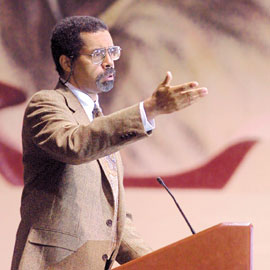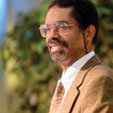 |


|
Autumn 2002 | Volume 25, Number 4
| ||||||||
| Integrity and Beyond
Law Professor and Author Stephen
Carter Helps Launch SPU’s Center for Scholarship and Faculty Development Called one of the nation’s leading public intellectuals by The New York Times, Stephen Carter is a man willing to take on difficult moral arguments, thoughtfully debating even the thorniest political, social and ethical issues.
The Christian author and professor of law entered into the public arena in the 1990s, when the terms integrity, civility and character were out of fashion and rarely heard in national dialogue. An articulate 21st-century oracle, Carter helped put back into the American consciousness, making him a natural choice to speak at the inauguration of a Seattle Pacific University center devoted to excellence in Christian scholarship and the advancement of character education.
Carter spoke at Seattle Pacific on October 17 during a “Day of Common
Learning” sponsored by the new Center for Scholarship and Faculty
Development. With Professor of English Susan VanZanten Gallagher at
its helm, the Center is a vital component of SPU’s plan for the 21st
century — and a key piece of The Campaign for Seattle Pacific University.
Overseeing numerous academic programs, the Center will also recruit,
fund and host the visits of outstanding Christian scholars such as
Carter, some of whom may receive permanent endowed chairs at SPU.
“IT IS A PERILOUS MOMENT to be talking about character,” said Stephen Carter after he stepped to the podium in Seattle Pacific University’s Brougham Pavilion. He pointed to a world overwhelmed by fear, a country “wallowing” in argument over its responsibilities at home and abroad, and an era in which character education is virtually ignored. The way in which we conduct ourselves as people and as citizens is key to the development of character in the young, Carter emphasized. “Whenever we think about educating for character, we tend to think about curricula, books to read, seminars, speakers. But education for character really takes place by example — by what we show people.” The following are edited excerpts from Carter’s address at SPU, in which he explored character in America, and the role of a Christian university dedicated to character-building. Thurgood Marshall and Character by Example I want to tell you a story. I was a law clerk many years ago for Thurgood Marshall, one of the great Justices ever to serve on the Supreme Court, and also one of the great human beings that it was ever my privilege to know. If you know about Thurgood Marshall’s life, you may be aware that before he was a Supreme Court Justice, he was already one of the most famous lawyers in America. He had spent his career litigating civil rights cases, criminal cases and other cases — for very little money, and often at risk to his own life. When it came time for Brown vs. Board of Education [the landmark 1954 Supreme Court case that ended racial segregation in American schools], it was argued, then re-argued, then re-argued a third time. It was not a fait accompli. It’s not as though — as you might think, looking back 50 years now — the world said, “Of course the Supreme Court is going to strike down racial segregation.” Very few people thought that was going to happen. As a matter of fact, most Americans probably thought it would be a bad decision to hand down. Well, Thurgood Marshall [who argued the case against segregation in Brown vs. Board of Education] was by that time a very experienced Supreme Court litigator. And the states that wanted to segregate decided to hire the best appellate lawyer in America to argue their case for segregation before the Court. At the time, that reputation rested with John W. Davis of the New York City law firm of Davis, Polk and Wardwell. He had argued in his career more cases before the Supreme Court than anyone else and had won nearly three-quarters of them. So the states that wanted to segregate went to John W. Davis, and they were pleased when he took the case. As a matter of fact, he didn’t just take the case for the fee, although the fee was substantial. John W. Davis was an old Virginia gentleman who actually believed that segregation was a good thing. Years later, in 1980, when Justice Marshall was in one of his storytelling modes, I asked him what he thought of John W. Davis. And I naturally expected that he would follow the tawdry conventions of that time, as well as this one, and begin to explain, in enormous detail, what a truly demonic fellow John W. Davis was. Which is why what actually happened astonished me. What Thurgood Marshall said about John W. Davis was this, and I quote: “John W. Davis — a good man, a great man, who just happened to believe in segregation.” Now, in saying this, Thurgood Marshall was not being facetious. Thurgood Marshall’s view of human possibility was sufficiently great that he could stretch across what some would consider the greatest moral divide of America in the 20th century, and reach out a hand of friendship and humanity across that divide, and say, “I see the commonalities between myself and those who oppose me, and they are greater than our differences.” That is how you teach character. You show it. Because what that inspired in me was the desire — which I still have not realized, although I struggle toward it — to be able to look on those with whom I disagree in the same way. I begin with this story not only because it illustrates my deep belief that character is taught by what we do more than by whatever curriculum one may choose, but also because it represents a kind of vision of our fellow humans that is, I think, essential to good character. The Failure to Civilize: Self-Indulgence and Measurism I don’t believe that any of us is capable of developing good character in isolation. We come into the world as these frail, helpless, unformed bundles of needs and desires. The project of human civilization is a project that rests upon the proposition that we can take these unformed bundles and transform them into mature adults who have a sense of connectedness to others — and even, perhaps, a sense of responsibility to others. Now this is a university that states that part of its mission is to engage the culture and change the world. We face a culture that, on this point, needs much engagement. For one thing that is happening in America these last decades is that the project of trying to civilize these young humans is dying. It is a project that is dying as we increasingly send into the culture two messages. One is the message that our own needs and desires are paramount; that self-seeking is actually a good thing; that self-restraint is a bad thing, somehow an inauthentic thing. Another message, equally dangerous, is that our true measure, as we go through education, is not our character, not our morality, not the strength of our faith — it is our grades and our test scores. Good character requires a virtue that is hard to teach in America today, and that virtue is self-restraint: the virtue of being willing to go without. It’s the virtue that says, “For the greater good or because my faith demands it of me, I am willing not to do the thing that I want to do.” That message is one that’s difficult to teach in a world in which young people are often told there is a problem if they are trying to withhold themselves in a variety of ways. There are many people out there who will tell you that if you try to teach, as my wife and I teach our children, that sex outside of committed marriage is something God wants them to avoid, then we are teaching them something that keeps them from being their own most authentic selves. But we are of the view that restraining desire is part of what maturity and civilization happen to be about. Any infant can be unrestrained, as can any animal of the field. What separates the human is precisely the ability to reach that point of recognizing the good in restraint. As a Christian and as a parent, it is also terrifying for me to listen to politicians at either end of the spectrum debate education. Because when the debates are held, the issue always in the end boils down to what is the way by which we’re going to increase our children’s scores on standardized tests — as though this matters, which as a parent and a Christian, I think it does not. This is a fallacy that in some of my work I ’ve labeled measurism, which is the tendency to substitute the things that we can measure for the things that we can’t, even when the things that we can’t are far more important. Because if we don’t pay attention to the civilizing of these unformed creatures, and we instead care only about maximizing their test scores while encouraging them to be self-seeking, then when they grow up they are still unformed creatures without a sense of moral responsibility, and they run Enron. They run large parts of the world. And they run them badly. I don’t mean they run them inefficiently. I don’t mean they run them unprofitably. I mean they run them morally badly. Garden, Wilderness and the Christian University Many of you will know Roger Williams’ famous metaphor of the garden and the wilderness. In the Williams metaphor, you’ll remember, the garden was the place of faith: the place where God’s people gathered together to worship, to study, to strengthen each other in the faith. The wilderness was the unevangelized world. The garden and the wilderness were separated by a high hedge wall — that’s the wall separating church and state. The point is that, for Williams, the people of faith stayed in the garden until it was time to go out into the wilderness to try to change wilderness to garden. But I want to suggest to you that what’s unusual about the religious university is that it is neither fully in the garden nor fully in the wilderness. Rather, in a sense, it has a foot in both worlds, necessarily, and even oftentimes has to do the work of translating one to the other — explaining the wilderness to the garden, or often more importantly, explaining the garden to the wilderness. That is a precarious balancing act — staying on that wall with one foot in the garden and one foot in the wilderness — but a school that pulls it off successfully is doing a great service to both the garden and the wilderness. To understand that service, I think of Auden’s 1946 Phi Beta Kappa poem — a kind of tongue-in-cheek verse in which he was describing the process of education of a little boy who grows up and is taught by his parents that some things are right and some things are wrong. And there’s this wonderful line Auden writes, which goes like this: “And when he occupies a college/truth is replaced by useful knowledge.” So much of modern education seems to take this as a proof text. Somehow educators are not doing the job unless they replace truth — the things the student brought in, believing them to be right — with another set of propositions that, while they may or may not be true, are useful. A Christian university has to believe that Auden’s vision, while it is right about what many secular schools do, is wrong about what has to be done. The Christian tradition is a tradition in which faith and knowledge have always gone together. Oh, it’s true, you can find Christian offshoots that have been anti-intellectual, as you can find Christian offshoots that have been so intellectual they’ve left no room for faith. But at the heart of the Christian tradition, for 2000 years, has been the notion that these are not opposites, nor are they in competition. So that the Christian school surely has to believe that Auden’s verse can be rewritten to say that “when he occupies a college/ truth is aided by useful knowledge.” At the heart of the idea of a Christian university is that it is possible to balance on the wall. It is possible to play both roles, to be fully a place of faith — fully the garden — and also fully a university in the most robust and intellectually exciting sense. And the way to do both is not by arbitrarily ruling some questions out of bounds, saying, “We don’t talk about those things here,” but rather by having understanding widely shared, top to bottom, that while we are about intellectual inquiry, we’re about that for God’s purposes. We don’t seek knowledge for its own sake. We are here as an educational institution, in answer to a call. And it is by answering that call that the culture is engaged. — BY HOPE MCPHERSON AND JENNIFER
JOHNSON GILNETT
|
Click on images to enlarge. |



